- Home
- Lemony Snicket
A Series of Unfortunate Events Collection: Books 1-13 with Bonus Material Page 4
A Series of Unfortunate Events Collection: Books 1-13 with Bonus Material Read online
Page 4
“Could we perhaps borrow a cookbook?” he said. “Count Olaf has instructed us to make dinner for his theater troupe tonight, and we can’t find a cookbook in the house.”
“Goodness,” Justice Strauss said. “Cooking dinner for an entire theater troupe seems like a lot to ask of children.”
“Count Olaf gives us a lot of responsibility,” Violet said. What she wanted to say was, “Count Olaf is an evil man,” but she was well mannered.
“Well, why don’t you come next door to my house,” Justice Strauss said, “and find a cookbook that pleases you?”
The youngsters agreed, and followed Justice Strauss out the door and over to her well-kept house. She led them through an elegant hallway smelling of flowers into an enormous room, and when they saw what was inside, they nearly fainted from delight, Klaus especially.
The room was a library. Not a public library, but a private library; that is, a large collection of books belonging to Justice Strauss. There were shelves and shelves of them, on every wall from the floor to the ceiling, and separate shelves and shelves of them in the middle of the room. The only place there weren’t books was in one corner, where there were some large, comfortable-looking chairs and a wooden table with lamps hanging over them, perfect for reading. Although it was not as big as their parents’ library, it was as cozy, and the Baudelaire children were thrilled.
“My word!” Violet said. “This is a wonderful library!”
“Thank you very much,” Justice Strauss said. “I’ve been collecting books for years, and I’m very proud of my collection. As long as you keep them in good condition, you are welcome to use any of my books, at any time. Now, the cookbooks are over here on the eastern wall. Shall we have a look at them?”
“Yes,” Violet said, “and then, if you don’t mind, I should love to look at any of your books concerning mechanical engineering. Inventing things is a great interest of mine.”
“And I would like to look at books on wolves,” Klaus said. “Recently I have been fascinated by the subject of wild animals of North America.”
“Book!” Sunny shrieked, which meant “Please don’t forget to pick out a picture book for me.”
Justice Strauss smiled. “It is a pleasure to see young people interested in books,” she said. “But first I think we’d better find a good recipe, don’t you?”
The children agreed, and for thirty minutes or so they perused several cookbooks that Justice Strauss recommended. To tell you the truth, the three orphans were so excited to be out of Count Olaf’s house, and in this pleasant library, that they were a little distracted and unable to concentrate on cooking. But finally Klaus found a dish that sounded delicious, and easy to make.
“Listen to this,” he said. “‘Puttanesca.’ It’s an Italian sauce for pasta. All we need to do is sauté olives, capers, anchovies, garlic, chopped parsley, and tomatoes together in a pot, and prepare spaghetti to go with it.”
“That sounds easy,” Violet agreed, and the Baudelaire orphans looked at one another. Perhaps, with the kind Justice Strauss and her library right next door, the children could prepare pleasant lives for themselves as easily as making puttanesca sauce for Count Olaf.
CHAPTER
Four
The Baudelaire orphans copied the puttanesca recipe from the cookbook onto a piece of scrap paper, and Justice Strauss was kind enough to escort them to the market to buy the necessary ingredients. Count Olaf had not left them very much money, but the children were able to buy everything they needed. From a street vendor, they purchased olives after tasting several varieties and choosing their favorites. At a pasta store they selected interestingly shaped noodles and asked the woman running the store the proper amount for thirteen people—the ten people Count Olaf mentioned, and the three of them. Then, at the supermarket, they purchased garlic, which is a sharp-tasting bulbous plant; anchovies, which are small salty fish; capers, which are flower buds of a small shrub and taste marvelous; and tomatoes, which are actually fruits and not vegetables as most people believe. They thought it would be proper to serve dessert, and bought several envelopes of pudding mix. Perhaps, the orphans thought, if they made a delicious meal, Count Olaf might be a bit kinder to them.
“Thank you so much for helping us out today,” Violet said, as she and her siblings walked home with Justice Strauss. “I don’t know what we would have done without you.”
“You seem like very intelligent people,” Justice Strauss said. “I daresay you would have thought of something. But it continues to strike me as odd that Count Olaf has asked you to prepare such an enormous meal. Well, here we are. I must go inside and put my own groceries away. I hope you children will come over soon and borrow books from my library.”
“Tomorrow?” Klaus said quickly. “Could we come over tomorrow?”
“I don’t see why not,” Justice Strauss said, smiling.
“I can’t tell you how much we appreciate this,” Violet said, carefully. With their kind parents dead and Count Olaf treating them so abominably, the three children were not used to kindness from adults, and weren’t sure if they were expected to do anything back. “Tomorrow, before we use your library again, Klaus and I would be more than happy to do household chores for you. Sunny isn’t really old enough to work, but I’m sure we could find some way she could help you.”
Justice Strauss smiled at the three children, but her eyes were sad. She reached out a hand and put it on Violet’s hair, and Violet felt more comforted than she had in some time. “That won’t be necessary,” Justice Strauss said. “You are always welcome in my home.” Then she turned and went into her home, and after a moment of staring after her, the Baudelaire orphans went into theirs.
For most of the afternoon, Violet, Klaus, and Sunny cooked the puttanesca sauce according to the recipe. Violet roasted the garlic and washed and chopped the anchovies. Klaus peeled the tomatoes and pitted the olives. Sunny banged on a pot with a wooden spoon, singing a rather repetitive song she had written herself. And all three of the children felt less miserable than they had since their arrival at Count Olaf’s. The smell of cooking food is often a calming one, and the kitchen grew cozy as the sauce simmered, a culinary term which means “cooked over low heat.” The three orphans spoke of pleasant memories of their parents and about Justice Strauss, who they agreed was a wonderful neighbor and in whose library they planned to spend a great deal of time. As they talked, they mixed and tasted the chocolate pudding.
Just as they were placing the pudding in the refrigerator to cool, Violet, Klaus, and Sunny heard a loud, booming sound as the front door was flung open, and I’m sure I don’t have to tell you who was home.
“Orphans?” Count Olaf called out in his scratchy voice. “Where are you, orphans?”
“In the kitchen, Count Olaf,” Klaus called. “We’re just finishing dinner.”
“You’d better be,” Count Olaf said, and strode into the kitchen. He gazed at all three Baudelaire children with his shiny, shiny eyes. “My troupe is right behind me and they are very hungry. Where is the roast beef?”
“We didn’t make roast beef,” Violet said. “We made puttanesca sauce.”
“What?” Count Olaf asked. “No roast beef?”
“You didn’t tell us you wanted roast beef,” Klaus said.
Count Olaf slid toward the children so that he looked even taller than he was. His eyes grew even brighter, and his one eyebrow raised in anger. “In agreeing to adopt you,” he said, “I have become your father, and as your father I am not someone to be trifled with. I demand that you serve roast beef to myself and my guests.”
“We don’t have any!” Violet cried. “We made puttanesca sauce!”
“No! No! No!” Sunny shouted.
Count Olaf looked down at Sunny, who had spoken so suddenly. With an inhuman roar he picked her up in one scraggly hand and raised her so she was staring at him in the eye. Needless to say, Sunny was very frightened and began crying immediately, too scared to even try to
bite the hand that held her.
“Put her down immediately, you beast!” Klaus shouted. He jumped up, trying to rescue Sunny from the grasp of the Count, but he was holding her too high to reach. Count Olaf looked down at Klaus and smiled a terrible, toothy grin, raising the wailing Sunny up even higher in the air. He seemed about to drop her to the floor when there was a large burst of laughter in the next room.
“Olaf! Where’s Olaf?” voices called out. Count Olaf paused, still holding the wailing Sunny up in the air, as members of his theater troupe walked into the kitchen. Soon they were crowding the room—an assortment of strange-looking characters of all shapes and sizes. There was a bald man with a very long nose, dressed in a long black robe. There were two women who had bright white powder all over their faces, making them look like ghosts. Behind the women was a man with very long and skinny arms, at the end of which were two hooks instead of hands. There was a person who was extremely fat, and who looked like neither a man nor a woman. And behind this person, standing in the doorway, were an assortment of people the children could not see but who promised to be just as frightening.
“Here you are, Olaf,” said one of the white-faced women. “What in the world are you doing?”
“I’m just disciplining these orphans,” Count Olaf said. “I asked them to make dinner, and all they have made is some disgusting sauce.”
“You can’t go easy on children,” the man with the hook-hands said. “They must be taught to obey their elders.”
The tall, bald man peered at the youngsters. “Are these,” he said to Count Olaf, “those wealthy children you were telling me about?”
“Yes,” Count Olaf said. “They are so awful I can scarcely stand to touch them.” With that, he lowered Sunny, who was still wailing, to the floor. Violet and Klaus breathed a sigh of relief that he had not dropped her from that great height.
“I don’t blame you,” said someone in the doorway.
Count Olaf rubbed his hands together as if he had been holding something revolting instead of an infant. “Well, enough talk,” he said. “I suppose we will eat their dinner, even though it is all wrong. Everyone, follow me to the dining room and I will pour us some wine. Perhaps by the time these brats serve us, we will be too drunk to care if it is roast beef or not.”
“Hurrah!” cried several members of the troupe, and they marched through the kitchen, following Count Olaf into the dining room. Nobody paid a bit of attention to the children, except for the bald man, who stopped and stared Violet in the eye.
“You’re a pretty one,” he said, taking her face in his rough hands. “If I were you I would try not to anger Count Olaf, or he might wreck that pretty little face of yours.” Violet shuddered, and the bald man gave a high-pitched giggle and left the room.
The Baudelaire children, alone in the kitchen, found themselves breathing heavily, as if they had just run a long distance. Sunny continued to wail, and Klaus found that his eyes were wet with tears as well. Only Violet didn’t cry, but merely trembled with fear and revulsion, a word which here means “an unpleasant mixture of horror and disgust.” For several moments none of them could speak.
“This is terrible, terrible,” Klaus said finally. “Violet, what can we do?”
“I don’t know,” she said. “I’m afraid.”
“Me too,” Klaus said.
“Hux!” Sunny said, as she stopped crying.
“Let’s have some dinner!” someone shouted from the dining room, and the theater troupe began pounding on the table in strict rhythm, which is an exceedingly rude thing to do.
“We’d better serve the puttanesca,” Klaus said, “or who knows what Count Olaf will do to us.”
Violet thought of what the bald man had said, about wrecking her face, and nodded. The two of them looked at the pot of bubbling sauce, which had seemed so cozy while they were making it and now looked like a vat of blood. Then, leaving Sunny behind in the kitchen, they walked into the dining room, Klaus carrying a bowl of the interestingly shaped noodles and Violet carrying the pot of puttanesca sauce and a large ladle with which to serve it. The theater troupe was talking and cackling, drinking again and again from their wine cups and paying no attention to the Baudelaire orphans as they circled the table serving everyone dinner. Violet’s right hand ached from holding the heavy ladle. She thought of switching to her left hand, but because she was right-handed she was afraid she might spill the sauce with her left hand, which could enrage Count Olaf again. She stared miserably at Olaf’s plate of food and found herself wishing she had bought poison at the market and put it in the puttanesca sauce. Finally, they were through serving, and Klaus and Violet slipped back into the kitchen. They listened to the wild, rough laughter of Count Olaf and his theater troupe, and they picked at their own portions of food, too miserable to eat. Before long, Olaf’s friends were pounding on the table in strict rhythm again, and the orphans went out to the dining room to clear the table, and then again to serve the chocolate pudding. By now it was obvious that Count Olaf and his associates had drunk a great deal of wine, and they slouched at the table and spoke much less. Finally, they roused themselves, and trooped back through the kitchen, scarcely glancing at the children on their way out of the house. Count Olaf looked around the room, which was filled with dirty dishes.
“Because you haven’t cleaned up yet,” he said to the orphans, “I suppose you can be excused from attending tonight’s performance. But after cleaning up, you are to go straight to your beds.”
Klaus had been glaring at the floor, trying to hide how upset he was. But at this he could not remain silent. “You mean our bed!” he shouted. “You have only provided us with one bed!”
Members of the theater troupe stopped in their tracks at this outburst, and glanced from Klaus to Count Olaf to see what would happen next. Count Olaf raised his one eyebrow, and his eyes shone bright, but he spoke calmly.
“If you would like another bed,” he said, “tomorrow you may go into town and purchase one.”
“You know perfectly well we haven’t any money,” Klaus said.
“Of course you do,” Count Olaf said, and his voice began to get a little louder. “You are the inheritors of an enormous fortune.”
“That money,” Klaus said, remembering what Mr. Poe said, “is not to be used until Violet is of age.”
Count Olaf’s face grew very red. For a moment he said nothing. Then, in one sudden movement, he reached down and struck Klaus across the face. Klaus fell to the floor, his face inches from the eye tattooed on Olaf’s ankle. His glasses leaped from his face and skittered into a corner. His left cheek, where Olaf had struck him, felt as if it were on fire. The theater troupe laughed, and a few of them applauded as if Count Olaf had done something very brave instead of something despicable.
“Come on, friends,” Count Olaf said to his comrades. “We’ll be late for our own performance.”
“If I know you, Olaf,” said the man with the hook-hands, “you’ll figure out a way to get at that Baudelaire money.”
“We’ll see,” Count Olaf said, but his eyes were shining bright as if he already had an idea. There was another loud boom as the front door shut behind Count Olaf and his terrible friends, and the Baudelaire children were alone in the kitchen. Violet knelt at Klaus’s side, giving him a hug to try to make him feel better. Sunny crawled over to his glasses, picked them up, and brought them to him. Klaus began to sob, not so much from the pain but from rage at the terrible situation they were in. Violet and Sunny cried with him, and they continued weeping as they washed the dishes, and as they blew out the candles in the dining room, and as they changed out of their clothes and lay down to go to sleep, Klaus in the bed, Violet on the floor, Sunny on her little cushion of curtains. The moonlight shone through the window, and if anyone had looked into the Baudelaire orphans’ bedroom, they would have seen three children crying quietly all night long.
CHAPTER
Five
Unless you have been very, ve
ry lucky, you have undoubtedly experienced events in your life that have made you cry. So unless you have been very, very lucky, you know that a good, long session of weeping can often make you feel better, even if your circumstances have not changed one bit. So it was with the Baudelaire orphans. Having cried all night, they rose the next morning feeling as if a weight were off their shoulders. The three children knew, of course, that they were still in a terrible situation, but they thought they might do something to make it better.
The morning’s note from Count Olaf ordered them to chop firewood in the backyard, and as Violet and Klaus swung the axe down over each log to break it into smaller pieces, they discussed possible plans of action, while Sunny chewed meditatively on a small piece of wood.
“Clearly,” Klaus said, fingering the ugly bruise on his face where Olaf had struck him, “we cannot stay here any longer. I would rather take my chances on the streets than live in this terrible place.”
“But who knows what misfortunes would befall us on the streets?” Violet pointed out. “At least here we have a roof over our heads.”
“I wish our parents’ money could be used now, instead of when you come of age,” Klaus said. “Then we could buy a castle and live in it, with armed guards patrolling the outside to keep out Count Olaf and his troupe.”
“And I could have a large inventing studio,” Violet said wistfully. She swung the axe down and split a log neatly in two. “Filled with gears and pulleys and wires and an elaborate computer system.”
“And I could have a large library,” Klaus said, “as comfortable as Justice Strauss’s, but more enormous.”
“Gibbo!” Sunny shrieked, which appeared to mean “And I could have lots of things to bite.”

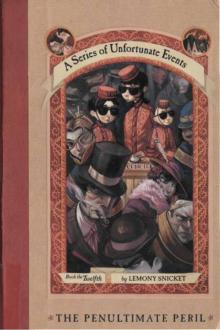 The Penultimate Peril
The Penultimate Peril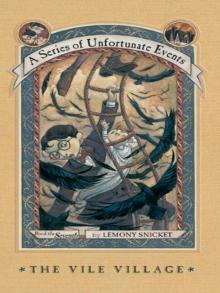 The Vile Village
The Vile Village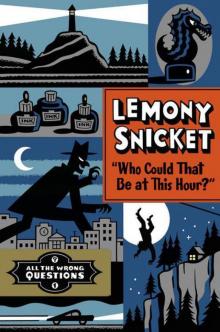 Who Could That Be at This Hour?
Who Could That Be at This Hour?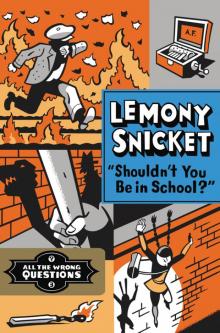 Shouldn't You Be in School?
Shouldn't You Be in School?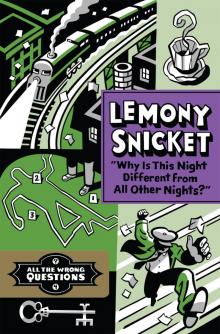 Why Is This Night Different From All Other Nights?
Why Is This Night Different From All Other Nights?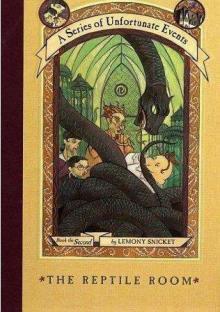 The Reptile Room
The Reptile Room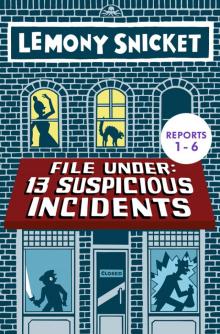 File Under: 13 Suspicious Incidents (1-6)
File Under: 13 Suspicious Incidents (1-6) The End
The End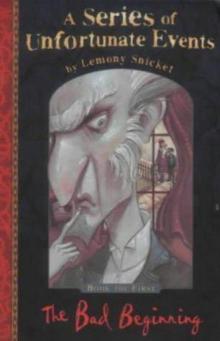 The Bad Beginning
The Bad Beginning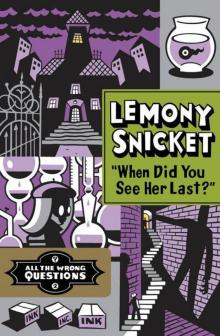 When Did You See Her Last?
When Did You See Her Last?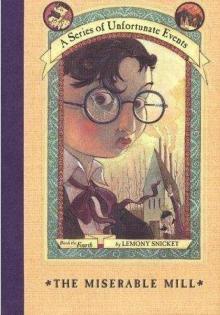 The Miserable Mill
The Miserable Mill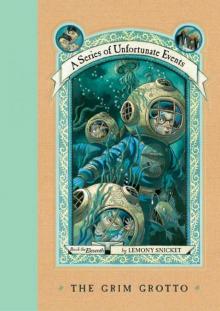 The Grim Grotto
The Grim Grotto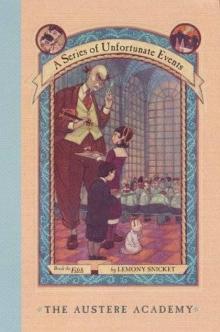 The Austere Academy
The Austere Academy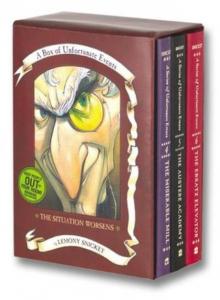 The Ersatz Elevator
The Ersatz Elevator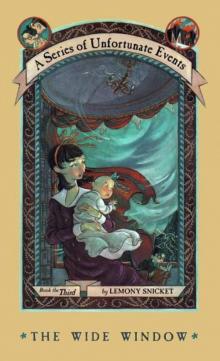 The Wide Window
The Wide Window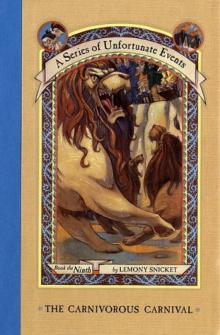 The Carnivorous Carnival
The Carnivorous Carnival A Series of Unfortunate Events Box: The Complete Wreck
A Series of Unfortunate Events Box: The Complete Wreck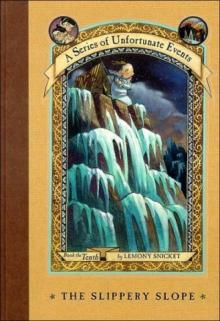 The Slippery Slope
The Slippery Slope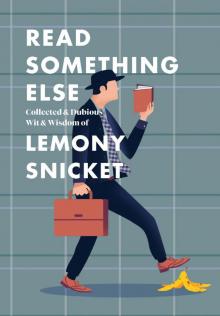 Read Something Else
Read Something Else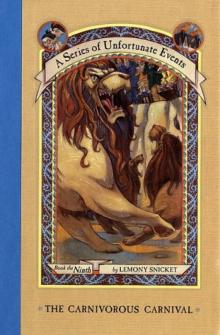 The Carnivorous Carnival asoue-9
The Carnivorous Carnival asoue-9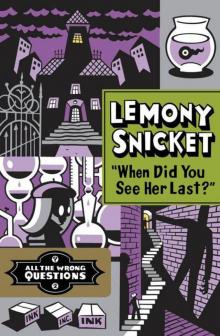 When Did You See Her Last
When Did You See Her Last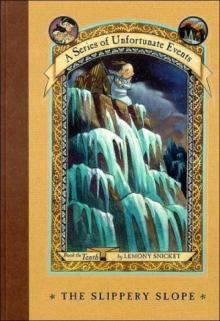 The Slippery Slope asoue-10
The Slippery Slope asoue-10 The Hostile Hospital asoue-8
The Hostile Hospital asoue-8 A Series of Unfortunate Events Collection: Books 1-13 with Bonus Material
A Series of Unfortunate Events Collection: Books 1-13 with Bonus Material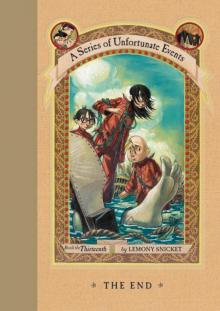 The End asoue-13
The End asoue-13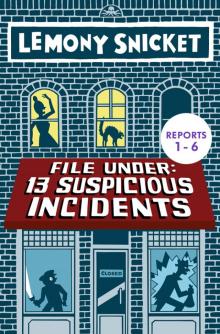 File Under
File Under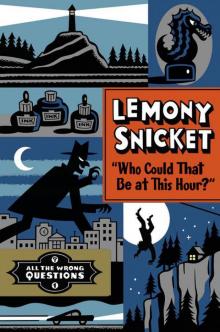 Who Could That Be at This Hour? (All the Wrong Questions)
Who Could That Be at This Hour? (All the Wrong Questions)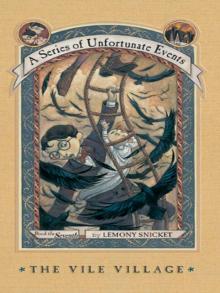 The Vile Village asoue-7
The Vile Village asoue-7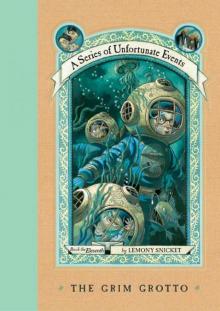 The Grim Grotto asoue-11
The Grim Grotto asoue-11